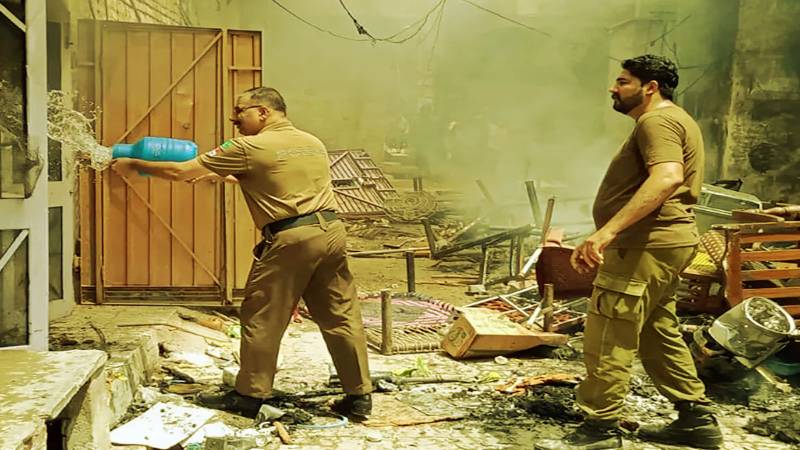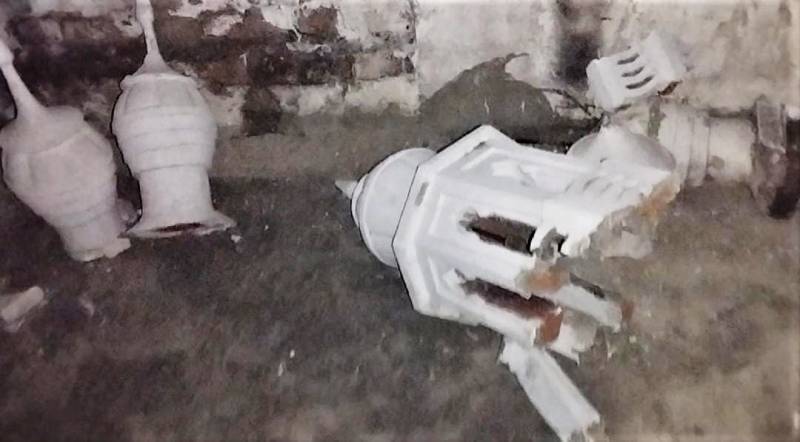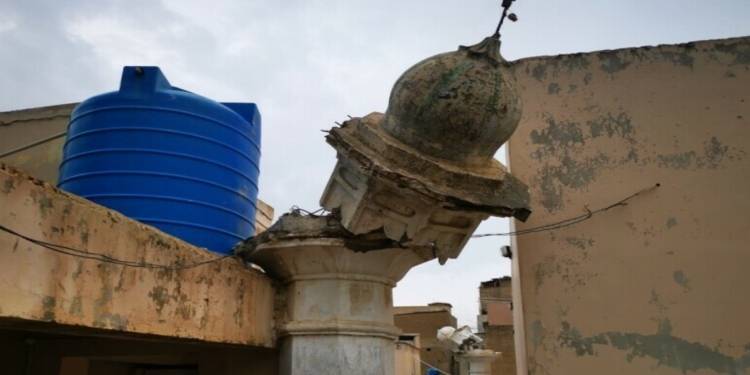
Blasphemy accusations were routinely used by Islamist parties to push their agendas ahead of the general elections in 2023, the human rights watchdog Centre for Social Justice (CSJ) has found. As a result, individuals from minority religions and Muslim sects were victimised, leading to further violence against religious minorities.
Attacks on places of worship of Christians, Ahmadis, Hindus and Sikhs were targeted across Pakistan in 2023 which indicate a frightening trend. Of the 62 worship sites violated through religiously motivated violence, 36 were Ahmadiyya worship places, 23 were churches, two were Hindu temples and one Sikh Gurduwara.
Jaranwala Incident:
In August, 2023, the attack on Jaranwala churches got media and government attention due to the scale of violence. 23 churches and around 90 houses belonging to Christians were destroyed after a piece of offensive writing was found in the morning hours. The police were unprepared and also not willing to control what appeared to be an organised attack after an orchestrated hate mongering campaign documented in the fact-finding carried out by the HRCP that week.
A People's Inquiry held by human rights experts found that at least 60 Christians were illegally detained in Sargodha, Faisalabad, and Jaranwala for investigations in cases related to blasphemy. The cases included the one involving Pastor Eleazar alias Vicky and five other individuals in Faisalabad, and the blasphemy cases against Zimran, Akash, Haroon Masih, and Zaki lacked due process of law. The accused and persons illegally detained—human rights defenders, Pastor Ghazala Shafique, and Lawyer Luke Victor—were maltreated. Moreover, four detainees in the alleged desecration of Quranic text in Jaranwala, Sargodha, and Sahiwal were refused access to legal counsel and contact with families during detentions until court intervention.
The Supreme Court is not satisfied with the investigation report of the Jaranwala incidents.
Six months later, on February 13, 2024, the Chief Justice of Pakistan rejected the police report submitted by the Advocate General of Punjab. The court noted the relevant information including the registration of FIRs, the number of persons nominated, the status of cases, and the progress made so far.
Ahmadi Persecution:

Despite the Supreme Court's ruling issued in 2022 against obstructing religious freedom of Ahmadiyya Jamaat inside places of worship and private properties, at least five cases were registered against the members of the Ahmadi community for performing animal sacrifices on Eid day within their houses, it added.

Sikh Gurudwara Attack:
A religious gathering at a Sikh Gurdwara in Sukkur was disrupted by some individuals, forcing the Sikhs to halt their prayers. The Sindh Human Rights Commission (SHRC) condemned the incident, declaring it a violation of Article 20 of the Constitution, but no official action was taken to arrest perpetrators as Muslims who attacked the Gurudwara could have been tried under the blasphemy act, Section 296 of the PPC.
Blasphemy Cases:
At least 329 people were accused under blasphemy laws in Pakistan in the 180 cases reported per data gathered by the CSJ. Among these, 247 were Muslims, 65 were Ahmadis, 11 were Christians and one victim was Hindu, while the religious affiliation of the five accused was not known. A large number of victims were Muslims (75%), and around 50% of Muslim victims belonged to the Shia minority sect.
As usual, the highest abuse of the blasphemy law was found in Punjab in the year 2023, with 179 accused, followed by 79 in Sindh, 37 in Azad Jammu and Kashmir, 32 in Khyber Pakhtunkhwa, and one each in Balochistan and Gilgit-Baltistan.
The cities with the highest number of reported blasphemy incidents were Lahore (26), Faisalabad (24), Mandi Bahuddin (18), Sargodha (13) and Gujranwala (11) in Punjab, while Karachi (16) and Badin (12) in Sindh, Kurram (19) in Khyber Pakhtunkhwa, and Kotli (21) in Azad Jammu and Kashmir saw the highest frequency of abuse.
Overall, since the introduction of religion-specific sections in the Pakistan Penal Code in 1987, at least 2449 persons have been formally or informally alleged to have committed blasphemy in Pakistan, according to data collected by the CSJ.
Seven people accused of committing blasphemy were killed extrajudicially in 2023. In another case, Muhammad Awais killed Saleem Masih for resisting a burglary at the latter's house and later accused the deceased of committing blasphemy as the victim happened to be a Christian.
Five killings took place in Punjab (two in Narowal, one each in Sheikhupura, Khanewal, and Nankana Sahib), while one each took place in Balochistan (Turbat), Azad Jammu & Kashmir (Mirpur), and Khyber Pakhtunkhwa (Mardan). Seven Muslims were killed after the allegation, while a Christian was accused after his death in Narowal.
According to the report, abuse of blasphemy allegations by Tehreek-e-Labaik Pakistan (TLP) resurfaced in Sargodha in May 2023 against the Shia, followed by attacks on Ahmadi places of worship and attacks on the pretext of blasphemy against Christians that spread in parts of Punjab and Sindh in the later months.
Forced Conversion of Minority Women and Girls:
At least 136 cases of abduction and forced conversions of minority girls and women were reported in Pakistan. Of these girls, 110 were Hindus and 26 were Christians, while 107 incidents took place in Sindh, 28 in Punjab, and one in Balochistan. 102 girls were reported abducted and converted, while the fate of 34 abducted girls was not known.
To address minorities' exclusion from educational opportunities, the Higher Education Department issued a notification on May 18th, 2020, circulated to relevant ministries and departments, calling to reserve a 2% quota for minorities for admissions at the university level. A follow-up notification issued on September 17th, 2020 called for a compliance report within three days.
However, compliance was yet to be achieved for admission to higher classes, partly because an affirmative measure should have started at the school level.
Recommendations:
The CSJ has urged the government to constitute a highly empowered Commission of Inquiry to probe into the issues and cases under Sections 295 A, B, and C and 298-A, B, and C to determine the nature of cases, the scale of abuse and remedies.
This Commission must take into account various judgments delivered by the Higher and Superior Courts, including the recommendations of the Judicial Inquiry into the incidents of Shanti Nagar-Khanewal (1997) and Gojra-Korian (2009) and the amendment bill to the laws moved by Senator Sherry Rehman (2010).
The report further suggests that the Commission must also make its report public within six months, with recommendations regarding legal, administrative, and educational measures for introducing effective safeguards to prevent the misuse of blasphemy laws. Other recommendations include providing reparations to victims and the falsely accused of blasphemy; and ensuring protection to the accused, witnesses, legal counsels and judges who rule fairly in false cases of blasphemy.

